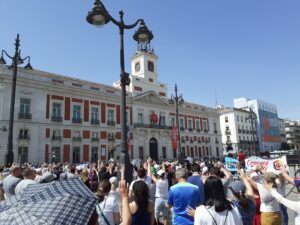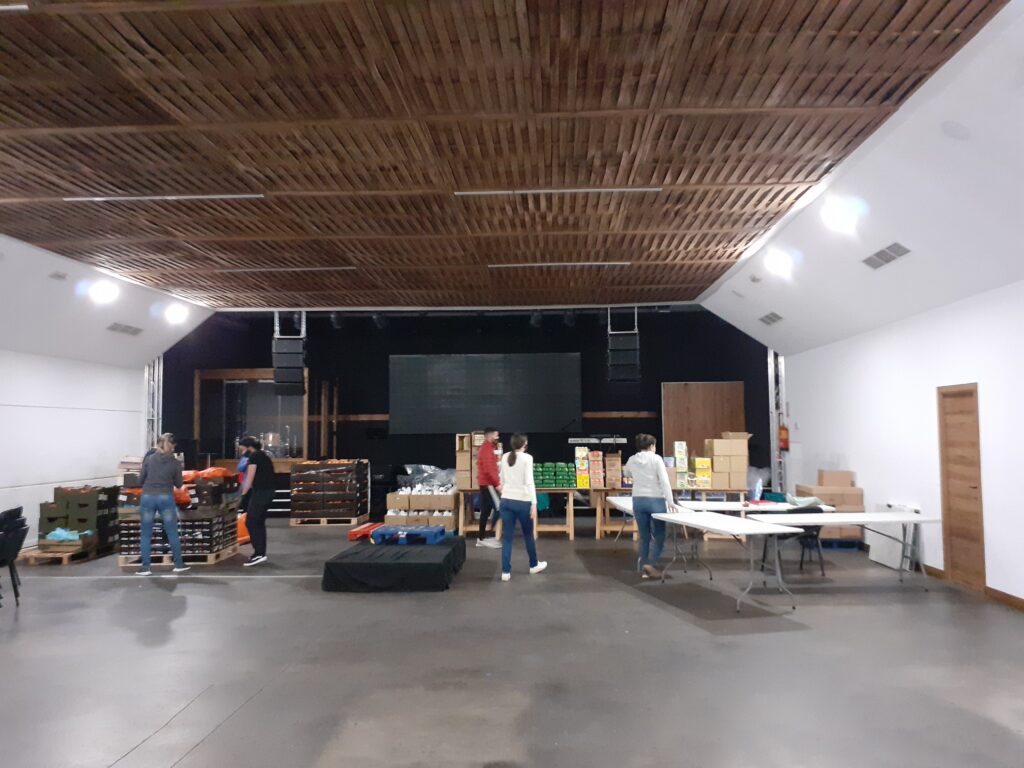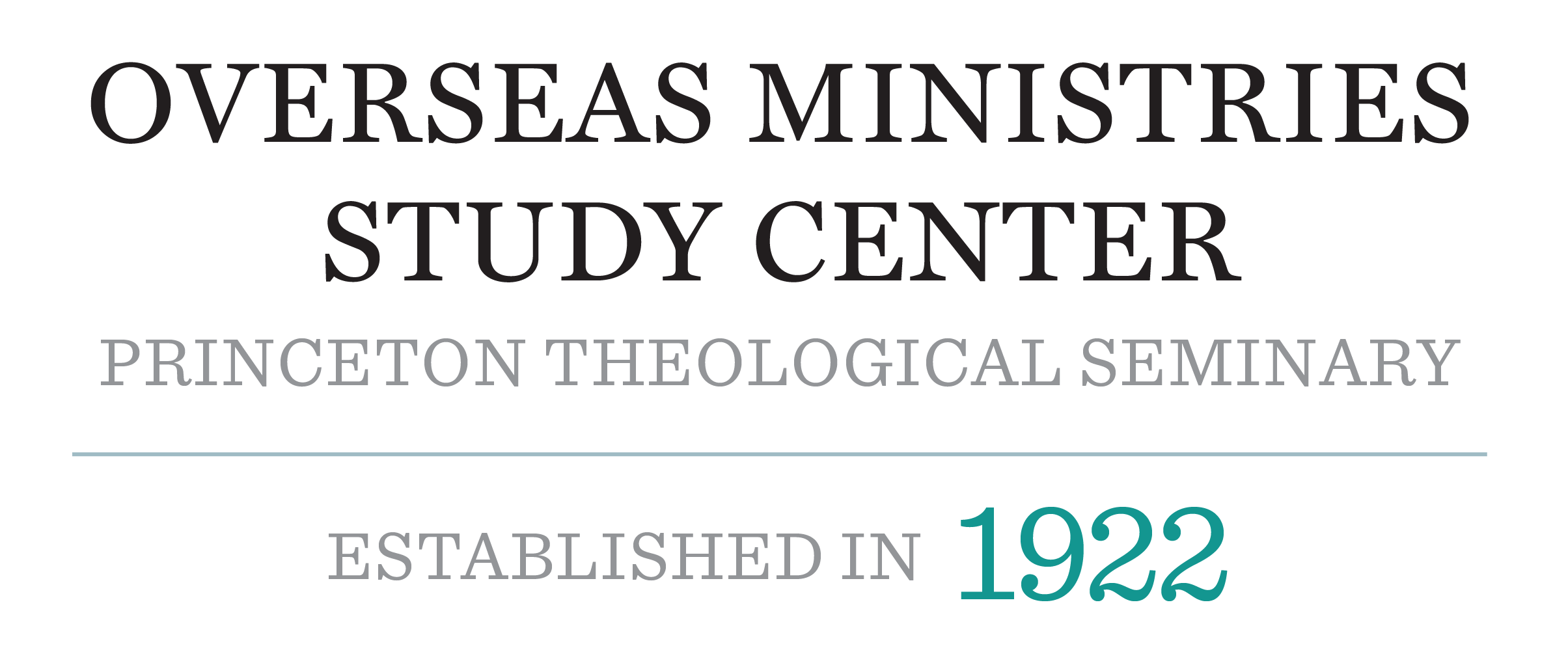By Marten van den Toren-Liefting – PhD researcher at the Protestant Theological University, Groningen, The Netherlands
Marten was trained as an anthropologist at the University of Utrecht before becoming a PhD candidate in the Department of Intercultural Theology/Missiology at the Protestant Theological University in Amsterdam|Groningen. Marten strives to incorporate theological and anthropological approaches in his research on Pentecostalism, migration, and the (Spanish) public sphere. His supervisor is Prof. Dr. Dorottya Nagy.
As the global pandemic was cautiously starting to wane in early 2021, I set out to Madrid to conduct ethnographic research among Pentecostal communities with significant connections to the Latin American continent. During one particular interview with a leader of a para-church organization – that mediates between churches and governmental entities – I observed behind his desk a picture of the parliament of the Autonomous Region of Madrid under which the words “pray for the city, because if it prospers, you too will prosper” (Jeremiah 29:7) could be read. With these accompanying words, this picture resonated with what I encountered among many Pentecostal communities in Madrid. I discovered migrant Pentecostal communities working toward and praying for the well-being of their pandemic-stricken city, primarily through Pentecostal church-run food banks.
On any Monday afternoon, in an industrial zone south of Madrid, a group of about 70 people – with shopping carts – could be seen queuing in front of an old warehouse. This group was comprised of Moroccan mothers with children, homeless people, Spaniards who recently lost their job or business due to the pandemic, and newly arrived Latin American migrants struggling to make ends meet in this city. The words “Jesus is changing lives today” could be seen on the warehouse’s facade. This was not any old warehouse but rather a Pentecostal church. Within this Pentecostal church, many volunteers were hard at work setting up food boxes and greeting the beneficiaries still waiting outside. The volunteers were all members of this Pentecostal church and were just as eclectic as the group of beneficiaries waiting outside. Almost all had a migratory background, whether from Colombia, Argentina, Mexico, or Venezuela. There were only three volunteers who were Spanish. This foodbank, run by a Pentecostal church on Madrid’s (literal) margins, was a space of incredible cultural and religious diversity. Moroccans, Spaniards, Latinos, Muslims, Pentecostals, and Roman Catholics all converged in this one space.

After all the beneficiaries were welcomed and all the boxes of canned food and fresh fruit were set up, volunteers gathered to pray behind closed doors not visible to the waiting beneficiaries outside. Julia, the Colombian leader of the foodbank who was an irregular migrant, passionately stated to the volunteers the importance of the presence of the Holy Spirit in this “ministry.” Hence, she motivated all those present to pray more fervently before the arrival of the beneficiaries. Almost every week, Julia would take the time to emphasize the importance of prayer, describing it as the most critical tool for working at the food bank, more important than the food itself or the many accompanying bureaucratic processes. One Monday afternoon – the day beneficiaries would come to collect food – Julia reminded the volunteers that when they do the right thing by establishing “God’s Kingdom” through their work at the food bank, the “enemy” would make himself known. It was believed that this rising up of the “enemy” could be seen in, for example, the illness of the volunteers or their general lack of availability on Monday afternoons. However, Julia encouraged the volunteers not to fear the “enemy,” as this only made evident that they were doing something good. After this motivational speech, all volunteers stood up as Julia led the group in prayer. It was raining and unpleasant for the beneficiaries who were queuing outside while the volunteers were praying inside. Inspired by this weather, Julia prayed that just like the rain, God’s love would fall in abundance on the now-soaked beneficiaries outside. Following, she called the beneficiaries by name, mentioning what they might be struggling with, be it unemployment, family issues, or addiction. She fervently prayed that the spirit of “incredulidad” (incredulity) would go away in Jesus’ name. She prayed that Muslims would come to know Jesus not simply as a prophet but as the son of God. She declared God to be central in all that would be done by the team of volunteers that day.

This brief vignette brings to light how alternate logics governed Pentecostal church-run food banks, often in contrast to those dominant in non-confessional welfare spaces in Europe (Gill and Lundsgaarde 2004; Gómez Bahillo and Valero Errazu 2017; Giera Llonch et al. 2015; Guía 2015; Hiilamo 2012; Salonen 2016). These food banks were perceived to be the site of a spiritual struggle. That which hindered the proper functioning of the food bank was not only the result of the desperation of beneficiaries or harmful convoluted bureaucratic processes but rather due to a struggle between God or the Holy Spirit and demonic forces. That is why prayer played a pivotal role in these food banks, as a way to engage with these more profound and fundamental realities that were perceived to impact their participation in welfare spaces and, by extension, the Spanish public sphere.[1] Thus, through my ethnographic research among Pentecostal communities in Madrid, I have come to recognize how, through Pentecostal church-run foodbanks, (irregular) migrants were able to participate in and contribute to welfare spaces and, by extension, the Spanish public sphere. These food banks became spaces that empowered already vulnerable communities to play their role in caring and praying for a pandemic-stricken city. However, this increased public participation of vulnerable Pentecostal communities through food banks also resulted in the public sphere being imbued with a new alternate logic. For these communities, the Spanish public sphere was not so much a space of convoluted bureaucracies, local politics, and welfare policies as it was a site for a spiritual struggle between demonic forces and God or the Holy Spirit. Thus, Pentecostal communities were also capable of engaging with Spanish welfare spaces and the public sphere on their own terms and toward their own ends.
Work Cited
[1] The centrality of a perceived spiritual battle is a broadly observed phenomenon among Pentecostal communities in many different (public) contexts (Lambek 2003; Newell 2007; Meyer 2004; Marshall 2019; Beltrán and Quiroga 2017; among others)
Reference Works
Beltrán, William Mauricio and Jesús David Quiroga. 2017. “Pentecostalismo y política electoral en Colombia (1991- 2014)”. Colombia Internacional (91): 187-212.
Gill, Anthony, and Erik Lundsgaarde. 2004. “State Welfare Spending and Religiosity: A Cross-National Analysis.” Rationality and Society 16 (4): 399-436.
Gómez Bahillo, Carlos, and Diana Valero Errazu. 2017. “Solidaridad y religión. La acción social en las confesiones minoritarias en España. El caso de Aragón.” ‘Ilu, Revista de Ciencias de las Religiones (22): 173-202.
Griera Llonch, Maria del Mar, Anna Clot Garrell, Julia Martínez Ariño, and Gloria García-Romeral Moreno. 2015. “Religión e instituciones públicas en España: hospitales y prisiones en perspectiva comparada.” Revista Internacional de Sociología 73 (3): 1-13.
Guia, Aitana. 2015. “Completing the Religious Transition?: Muslims and Catholics Navigate Secularism in Democratic Spain.” New diversities (17): 95-110.
Hiilamo, Heikki. 2012. “Rethinking the role of church in a socio‐democratic welfare state.” International Journal of Sociology and Social Policy 32 (7/8): 401-414.
Lambek, Michael. 2003. “Rheumatic irony: questions of agency and self-deception as refracted through the art of living with spirits.” Social Analysis 47 (2): 40-59.
Marshall, Ruth. 2019. Political spiritualities: the Pentecostal revolution in Nigeria. Chicago: University of Chicago Press.
Meyer, Birgit. 2004. ““Praise the Lord”: Popular Cinema and Pentecostalite Style in Ghana’s New Public Sphere.” American Ethnologist 31 (1): 92-110.
Newell, Sasha. 2007. “Pentecostal witchcraft: Neoliberal possession and demonic discourse in Ivoirian Pentecostal Churches.” Journal of religion in Africa 37 (4): 461-490.
Salonen, Anna Sofia. 2016. “Locating Religion in the Context of Charitable Food Assistance: An Ethnographic Study of Food Banks in a Finnish City.” Journal of Contemporary Religion 31 (1): 35-50.



